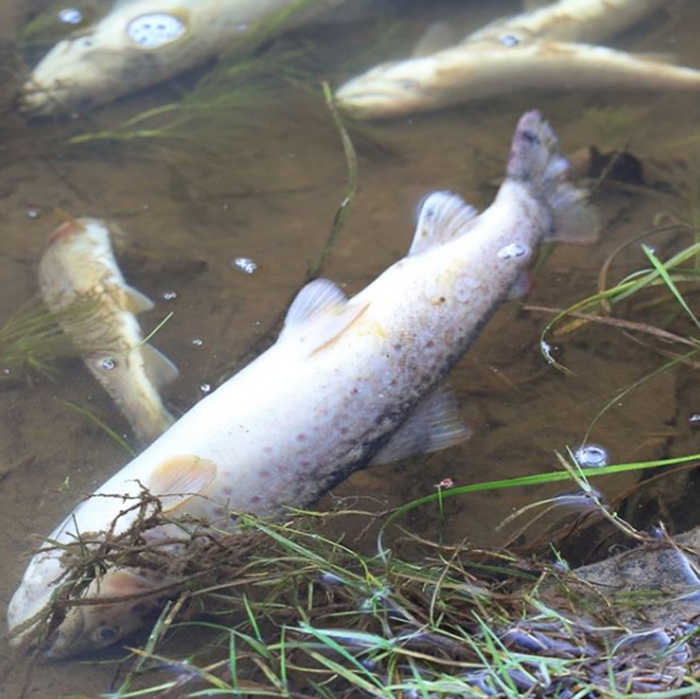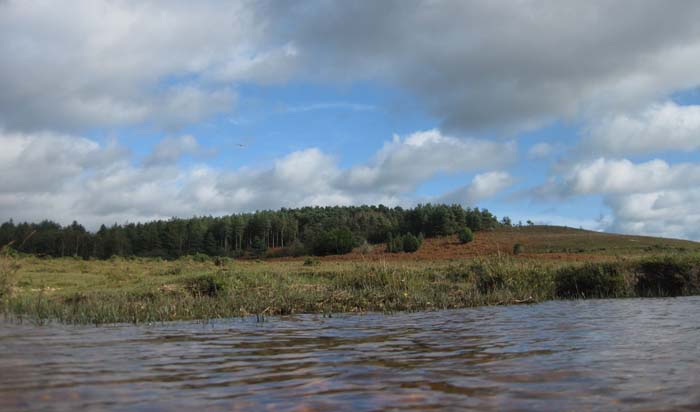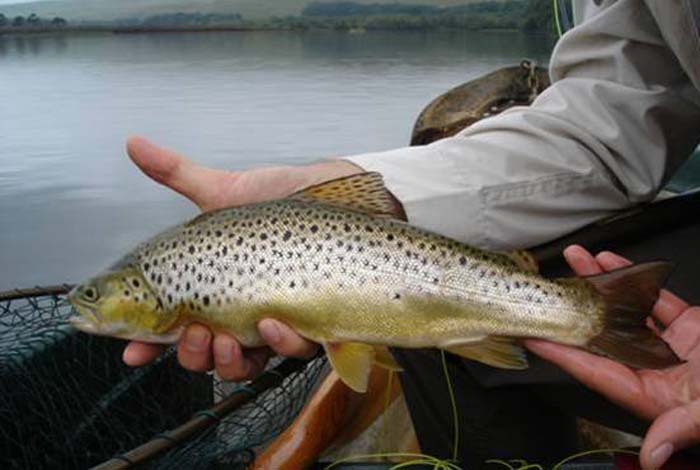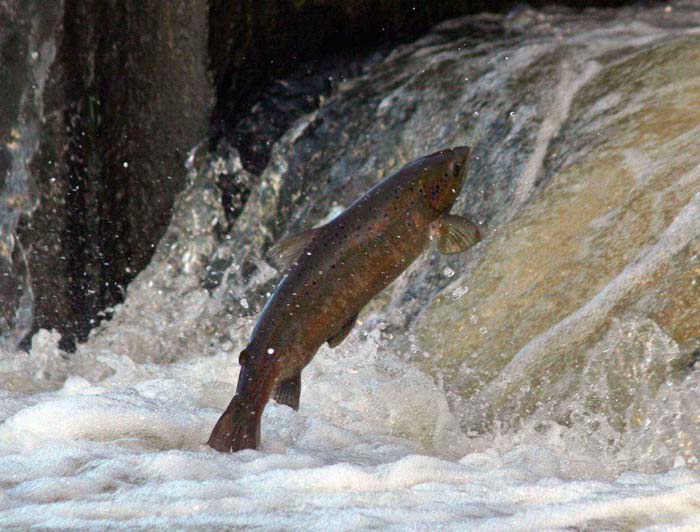
Photo provided courtesy of Salmon & Trout Conservation – UK.
By Skip Clement
Fresh Green Salads Impacting Upper Itchen With Dead Trout and Salmon
Press Release: 17th June 2019 for immediate publication
[dropcap]S[/dropcap]ewage and pesticides from a salad washing factory owned by Bakkavör Group Plc may present a serious threat to aquatic invertebrate life on a highly protected English chalkstream
The Environment Agency’s response to a formal notification of environmental damage made by Salmon & Trout Conservation (S&TC) in June 2018, pursuant to the Environmental Liability Directive, confirms the wild fish conservation charity’s fears:
Discharges from Bakkavör’s site at Alresford are threatening the fragile Upper Itchen and Alresford Pond
Bakkavör www.bakkavor.com is a leading supplier of fresh food and salads to UK supermarkets.
The EA’s wide-ranging investigation was prompted by the results of S&TC’s invertebrate sampling at a site immediately downstream of Bakkavör’s outflows.

The Itchen. Photo provided courtesy of Salmon & Trout Conservation – UK.
A copy of the sampling report is available at Aquascience Consultancy Ltd.
The threat from these activities was highlighted by Joe Crowley on the BBC’s Countryfile Chalkstream Special (see chalk-streams video below).
The EA investigation firstly exposed a failing in the factory’s own sewage works. The sewage is now being tankered away and S&TC says discharges should not restart. The headwaters of a chalkstream is not the right place to dump sewage.
The EA investigations also exposed a potential pesticide threat. The EA has not been able to rule out damage caused by traces of pesticides present on the salad leaves used by Bakkavör and which are being subsequently washed into the Upper Itchen. The EA is now undertaking more monitoring work. S&TC will follow the results of this work closely.
The S&TC notification has highlighted a wider national issue, that of the EA being unable to look at the impact on wildlife from chronic, low level and cumulative exposure to combinations of different pesticides. This is directly relevant, not just to salad washing but to agriculture in general. S&TC will continue to raise its scientific evidence at the highest levels within UK Government and the European Commission to influence the changes required to provide our chalkstreams and all rivers with proper protection.
The EA also recognised specific damage to Alresford Pond from nitrates, which now requires remediation plans to be drawn up, as well as a severe sediment issue in the pond that threatens its long-term value to wildlife. Alresford Pond is a Site of Special Scientific Interest.

Photo provided courtesy of Salmon & Trout Conservation – UK.
Nick Measham, S&TC’s Deputy CEO comments:
The EA’s response to S&TC’s species-level monitoring shows the necessity to go beyond the technical confines of the Water Framework Directive to tackle the worrying declines in aquatic invertebrate life in the Upper Itchen. The EA’s “family-level measure” shows invertebrates to be fine at its chosen sample point well downstream of the factory, but our sample point, and the EA’s own work at Alresford, indicate real threats. The only sensible way to protect the river is for Bakkavör to be required to put the water it uses back into the river at the same quality at which it abstracts. If it can’t do that, it must cease discharging altogether.”
S&TC is delighted that the EA has persuaded Bakkavör Group Plc to consider its whole operation at Alresford to protect the Itchen. S&TC’s fierce lobbying has already stopped the company using chlorinated chemicals in its overnight wash.
S&TC is happy to work with Bakkavör Group Plc if its management begins to show a genuine willingness to undertake efforts to remedy the impacts of its operations and contribute towards restoration efforts, but S&TC will pursue the company relentlessly if it does not fulfill its obligations to protect the Upper Itchen in the future.
Dr. Janina Gray, S&TC’s Head of Science & Environmental Policy added:
The EA cannot continue to put chemicals, especially pesticides, in the too difficult to deal with box. The Upper Itchen highlights urgent action is required to monitor and regulate the synergistic and/or additive effects of chemicals. This cocktail of chemicals is having an environmental impact now and can no longer be ignored. S&TC see the formal notification to the EA as a first step in better understanding the pressures impacting the Upper Itchen, now we will be seeking action to address these. Business as usual is no longer an option.”

The Atlantic salmon – the finest animal from the sea. Photo provided courtesy of Salmon & Trout Conservation – UK.
[information]
Issued by Corin Smith comms@salmon-trout.org(07463 576892) on behalf of Salmon and Trout Conservation. For more information please contact janina@salmon-trout.org and nick@salmon-trout.org on 01425 652461
For more information and resources please visit Salmon-Trout.org
[/information]
About:
Salmon & Trout Conservation (S&TC) was established as the Salmon & Trout Association (S&TA) in 1903 to address the damage done to our rivers by the polluting effects of the Industrial Revolution. Since then, S&TC has worked to protect fisheries, fish stocks and the wider aquatic environment for the public benefit. S&TC has charitable status in England, Wales and Scotland and its charitable objectives empower it to address all issues affecting fish and the aquatic environment, supported by robust evidence from its scientific network, and to take the widest possible remit in protecting salmonid fish stocks and the aquatic environment upon which they depend. Read more . . .
Bakkavör Alresford Salads Impacting Upper Itchen
NEWS RELEASE Sewage and pesticides from a salad washing factory owned by Bakkavör Group Plc may present a serious threat to aquatic invertebrate life on a highly protected English chalkstream. The Environment Agency’s response to a formal notification of environmental damage made by S&TC in June 2018, pursuant to the Environmental Liability Directive, confirms the wild fish conservation charity’s fears: discharges from Bakkavör’s site at Alresford are threatening the fragile Upper Itchen and Alresford Pond. Bakkavör www.bakkavor.com is a leading supplier of fresh food and salads to UK supermarkets. The EA’s wide-ranging investigation was prompted by the results of S&TC’s invertebrate sampling at a site immediately downstream of Bakkavör’s outflows. A copy of the sampling report (produced by Aquascience Consultancy Ltd) is available here: http://bit.ly/2RhzimT The threat from these activities was highlighted by Joe Crowley on the BBC’s Countryfile Chalkstream Special.www.bbc.co.uk/iplayer/episode/m0005xlv/countryfile-chalk-streams The EA investigation firstly exposed a failing in the factory’s own sewage works. The sewage is now being tankered away and S&TC says discharges should not restart. The headwaters of a chalkstream is not the right place to dump sewage. The EA investigations also exposed a potential pesticide threat. The EA has not been able to rule out damage caused by traces of pesticides present on the salad leaves used by Bakkavör and which are being subsequently washed into the Upper Itchen. The EA is now undertaking more monitoring work. S&TC will follow the results of this work closely. The S&TC notification has highlighted a wider national issue, that of the EA being unable to look at the impact on wildlife from chronic, low level and cumulative exposure to combinations of different pesticides. This is directly relevant, not just to salad washing but to agriculture in general. S&TC will continue to raise its scientific evidence at the highest levels within UK Government and the European Commission to influence the changes required to provide our chalkstreams and all rivers with proper protection. The EA also recognised specific damage to Alresford Pond from nitrates, which now requires remediation plans to be drawn up, as well as a severe sediment issue in the pond that threatens its long-term value to wildlife. Alresford Pond is a Site of Special Scientific Interest. Nick Measham, S&TC’s Deputy CEO comments: “The EA’s response to S&TC’s species-level monitoring shows the necessity to go beyond the technical confines of the Water Framework Directive to tackle the worrying declines in aquatic invertebrate life in the Upper Itchen. The EA’s “family-level measure” shows invertebrates to be fine at its chosen sample point well downstream of the factory, but our sample point, and the EA’s own work at Alresford, indicate real threats. The only sensible way to protect the river is for Bakkavör to be required to put the water it uses back into the river at the same quality at which it abstracts. If it can’t do that, it must cease discharging altogether.” S&TC is delighted that the EA has persuaded Bakkavör Group Plc to consider its whole operation at Alresford to protect the Itchen. S&TC’s fierce lobbying has already stopped the company using chlorinated chemicals in its overnight wash. S&TC is happy to work with Bakkavör Group Plc if its management begins to show a genuine willingness to undertake efforts to remedy the impacts of its operations and contribute towards restoration efforts, but S&TC will pursue the company relentlessly if it does not fulfill its obligations to protect the Upper Itchen in the future. Dr. Janina Gray, S&TC’s Head of Science & Environmental Policy added: “The EA cannot continue to put chemicals, especially pesticides, in the too difficult to deal with box. The Upper Itchen highlights urgent action is required to monitor and regulate the synergistic and/or additive effects of chemicals. This cocktail of chemicals is having an environmental impact now and can no longer be ignored. S&TC see the formal notification to the EA as a first step in better understanding the pressures impacting the Upper Itchen, now we will be seeking action to address these. Business as usual is no longer an option.” ENDS Issued by Corin Smith comms@salmon-trout.org(07463 576892) on behalf of Salmon and Trout Conservation. For more information please contact janina@salmon-trout.org and nick@salmon-trout.org on 01425 652461For more information and resources please visit: www.salmon-trout.org/2019/06/17/bakkavor-alresford-salads-impacting-upper-itchen/ Notes to Editors (1) Salmon and Trout Conservation Salmon & Trout Conservation (S&TC) was established as the Salmon & Trout Association (S&TA) in 1903 to address the damage done to our rivers by the polluting effects of the Industrial Revolution. Since then, S&TC has worked to protect fisheries, fish stocks and the wider aquatic environment for the public benefit. S&TC has charitable status in England, Wales and Scotland and its charitable objectives empower it to address all issues affecting fish and the aquatic environment, supported by robust evidence from its scientific network, and to take the widest possible remit in protecting salmonid fish stocks and the aquatic environment upon which they depend. https://www.salmon-trout.org/news (2) The Riverfly Census THE CENSUS PROCESS The Riverfly Census utilises the invertebrate assemblage: presence, absence and abundance of certain invertebrates and the specific set of conditions they need to thrive, to indicate the types of stress our rivers are experiencing. This species-level resolution shows pressures which family-based Water Framework Directive (WFD) methods fail to capture. The Riverfly Census has spanned three years, across 12 rivers in England. Multiple sample sites were carefully selected on each. Kick-sweep sampling was completed in spring and autumn to EA-accepted guidelines, at all sample sites. Sampling and species-level identification were carried out by professional entomologists at Aquascience Consultancy Ltd. Species data were inputted to Aquascience’s biometric calculator to obtain scores against key stress types: chemical, nutrient, sediment and flow. The data was then evaluated in a whole catchment context to pinpoint the likely suspects contributing to the river’s deterioration. The data was compiled for, and is being reported to, local stakeholders and policy makers to improve management and conservation of our rivers.
Posted by Salmon & Trout Conservation on Monday, June 17, 2019

